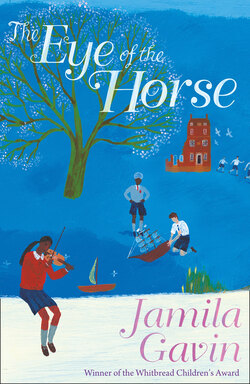Читать книгу The Eye of the Horse - Jamila Gavin - Страница 8
TWO The Sacrifice
ОглавлениеThe clerk’s wife sighed. Her three fat sons clustered round her with pouting faces. Her husband had insisted that they too must fast. ‘It is our duty to support the Mahatma,’ explained the clerk.
‘Why, Pa?’ protested the eldest fat son. ‘How does it help the cause?’
‘After all, he won’t know,’ said the second fat son. ‘No one will know.’
‘Except us and our empty stomachs,’ moaned the third fat son.
But the clerk mercilessly reduced his family’s diet to a handful of nuts and one piece of fruit per day, saying, ‘At least you won’t starve like Gandhiji. He’s taking nothing, only water.’
It was too bad the way he carried his adoration of the Mahatma to such extreme limits and it wasn’t fair on the boys. The clerk’s wife gazed with anguished adoration at her three beautiful sons, as chubby as the god Ganesh and triumph of her womb.
They were a good Hindu family belonging to the Shatryia caste, who had managed to survive the troubles. They had only left the district temporarily when first Muslim, then Sikh gangs rampaged through. But as things quietened down, they returned to rebuild their home, and re-establish their place in the community.
Surely, they were entitled to some dignity? After all, they had to think of their reputation, and the future wives they would need to find for the boys. Yet since the clerk’s conversion to Gandhism he had stripped their modest home of everything that he called luxuries; their bedsteads, chairs, tables, ornaments, rugs – all had been given away or disposed of. He forbade his wife to wear jewellery and made her give away her best silk saris. From now on, they slept on thin mattresses on rickety charpoys, and all of them wore garments made from khadi, the raw rough cotton which had been spun by hand in the villages. She was sure the tailor had smirked when instructed to make their outfits.
Their food too had to be the most humble; just dhal, yogurt, fruit and nuts. No spices, no flavourings and no sweets were allowed.
His children were outraged. Three shiny plump boys, with cheeks like golden butter, who had been nourished and pampered from birth, with lashings of rich milk, cream, butter and cheese; who were used to curries cooked in the highest quality ghee, and ate only the freshest vegetables and fruit, and the finest white rice: whose mother adored making sweets and pastries and savoury samosas – they were to be denied all this – anything that smacked of pleasure or frivolity was banned. Food was for survival, because that was the lot of the poor, and it was with the poor that the clerk forced the whole family to identify.
Whenever they travelled by train, he insisted they cram themselves into the overflowing third class, along with malodorous peasants with their bundles and baskets.
But quite the worst indignity of all, was that the clerk made his wife clean out the latrines – the job of an Untouchable. She had begged and pleaded and screamed, and even threatened to leave home, but to no avail. The clerk told her that Gandhi had declared caste to be evil and must be done away with; that there was no longer any such thing as an ‘Untouchable’. People, who until now had been the lowest of the low – so low that they were outside caste itself, fit only to do the most menial of jobs, they were now to be called ‘Harijans’ – ‘children of God’. Everyone is equal in the eyes of God, Gandhi said, and he made his own wife clean out the latrines.
‘If Gandhi’s wife can clean out the latrines, then so can you,’ intoned the clerk without sympathy. ‘It is God’s work the same as everything else.’
‘Then why don’t you do it,’ hissed his wife under her breath.
‘What did you say?’ asked the clerk looking up from The Times of India he was reading.
‘I didn’t speak,’ murmured his wife, hurrying away with furious tears streaming down her face. What did he care that none of her women friends would come to take tea with her any more? And she was sure that her own children flinched from her when she kissed them.
Luckily for the three fat boys, the fast only lasted five days, but they made up for it by secretly buying sweets and gelabees from the sweet-seller, whom they passed each day on their way to school. Their mother always made sure they had enough annas in their pockets for whatever extra food they wanted to buy in the bazaar.
During that time, the horse was still to be seen in the district, though only fleetingly.
Gandhi ended his fast on Sunday, 18 January 1948.
